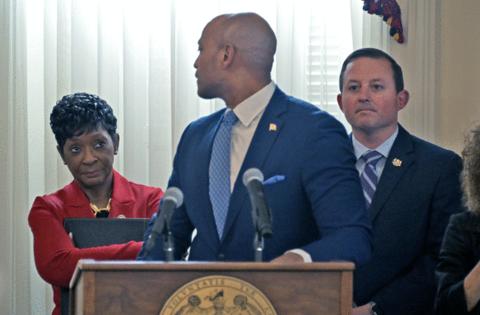Asked for a yes or no on nonprofit transparency, top Maryland Democrats don't answer
Published in News & Features
BALTIMORE — It should be an easy yes-or-no answer, according to taxpayer advocate David Williams.
But when Spotlight on Maryland asked the state’s top three Democrats whether they would ensure transparency and accountability as tax dollars flow through nonprofits, none offered a yes or no response.
The Baltimore Sun reported last month that neither state budget officials nor individual agencies can say exactly how much state money is flowing to nonprofits each year. That disclosure has led some state officials to call for more oversight.
In response, Spotlight on Maryland — a partnership of The Sun, WBFF FOX45 in Baltimore and WJLA in Washington, D.C. — has launched an investigation into how much taxpayer money is allocated to Maryland nonprofits and how those dollars are spent.
As part of that reporting, Spotlight on Maryland asked Gov. Wes Moore, House Speaker Adrienne A. Jones and Senate President Bill Ferguson, if they would ensure full transparency and accountability around nonprofit funding. After receiving no response from Ferguson and Jones, Spotlight on Maryland sent a follow-up question to all three, asking if they would assist the investigation in the public interest as journalists follow the money through Maryland nonprofits.
Moore, Jones and Ferguson did not respond to the follow-up question.
“This is crazy. It’s an easy answer,” said Williams, president of the Taxpayers Protection Alliance, an advocacy group based in Washington, D.C. “They should all say yes.”
Moore, for his part, gave an answer on camera to a Spotlight on Maryland reporter at an unrelated news event in Salisbury last week.
“I think people know and realize that our administration believes in full transparency, that we understand that the things that we are going to support are things that are both sustainable and effective. And when you’re looking at the entire budget for the state of Maryland, we are, we are very wise and smart stewards of taxpayer dollars to make sure that the right capital is going to the right usages,” the governor said.
When The Sun asked last month whether Ferguson believes taxpayers should have access to a full accounting of how their money is spent and how much of it flows to nonprofits in Maryland, he said:
“All public dollars should be spent wisely and with the utmost care, whether a public agency or a nonprofit uses them. To that end, nonprofits are an important bridge between the state government and the communities they serve. That’s why we have a robust audit division of the Department of Legislative Services that has been doing this important oversight work for decades.”
As part of its July reporting, The Sun sent inquiries to individual state departments and agencies, asking them to provide the amount of money they allocate to nonprofits. A few offered specific dollar amounts.
“Many nonprofits receive funds directly from agency grant programs, and we don’t track that centrally,” said Raquel Coombs, chief of staff for the Department of Budget and Management, in a July email.
This lack of oversight raises concern, especially for a state that needed to make cuts and raise taxes to resolve a $3.3 billion budget deficit earlier this year.
Nonprofit spending “increases the size of government,” Williams said. The more that government spends — on nonprofits and other line items — the more taxpayer money that is needed to fund the government, he said.
One political analyst said the state’s top Democrats appear “overly cautious” in not answering Spotlight on Maryland’s follow-up questions on nonprofit spending.
“It seems like a no-brainer,” said Flavio Hickel, a political science professor at Washington College. “You’d think they would say, ‘I will do everything in my power to ensure good governance with taxpayer money.'”
Why aren’t they saying that?
“There are good nonprofits, but they’re probably being cautious in case one bad actor fell through the cracks on their watch,” Hickel said. “They’re probably being overly cautious to prevent campaign ads down the line.”
Even as the state’s top leaders declined to answer Spotlight on Maryland’s follow-up, the governor was quoted in a news release about his chief of staff, Fagan Harris, leaving for the top spot at the Abell Foundation, one of the state’s biggest and most influential nonprofits with more than $300 million in assets.
“While he will be deeply missed personally and professionally, I look forward to working closely with him as he leads the Abell Foundation for years to come,” Moore said.
Top officials in government administrations moving to nonprofits is similar to Pentagon officials going to work for defense contractors, Williams said.
“We need more checks and balances to stop the revolving door,” he said. “The government and nonprofits are way too cozy. There needs to be a firewall.”
Hickel said he couldn’t comment on the specifics of Harris moving to a nonprofit and noted that it could be “perfectly coincidental and benign.”
But, he added, “it does raise questions” about the relationship between the governor’s office and influential nonprofits that shape life in Maryland.
“It’s not uncommon at all, though, to see someone in a high government role going to work at a nonprofit,” Hickel said. “We advise students to do that. We tell them to do legislative work for a few years, meet people, then go to a nonprofit.”
---------------
©2025 The Baltimore Sun. Visit at baltimoresun.com. Distributed by Tribune Content Agency, LLC.







Comments